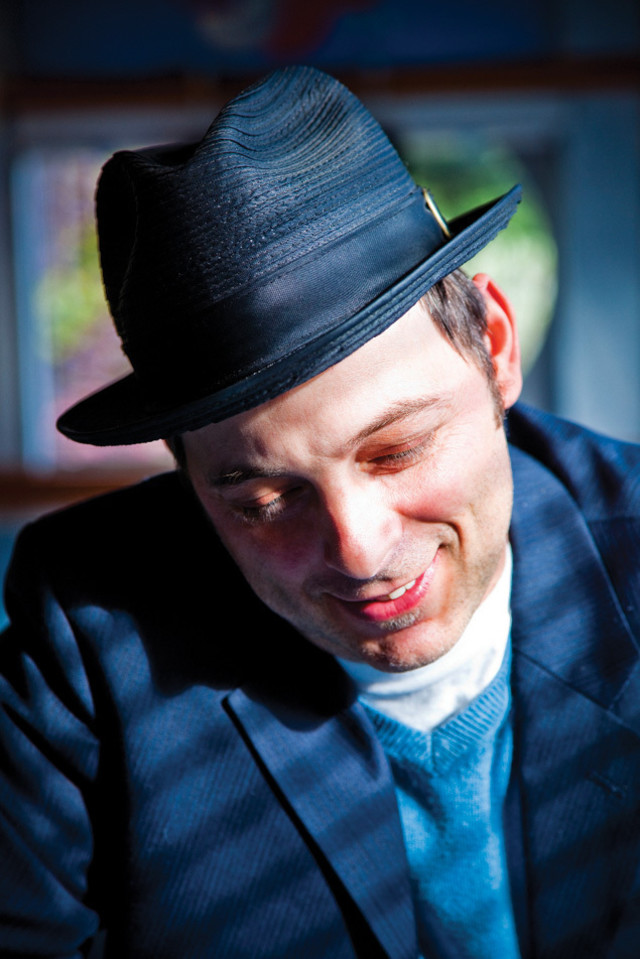A Question For… Jonathan Evison

TO GET TO KNOW author Jonathan Evison, you need to meet him on his own turf: Bainbridge Island, where the rising literary star writes—and lives—like J. D. Salinger. The 43-year-old has a cabin in the woods, drives a beat-up Malibu with moss on the hood, and raises rabbits. He conducts interviews at the local pub, where everyone seems to have read an advance copy of his latest book, West of Here, a sprawling historical saga set in the Pacific Northwest that was in its second printing before the first copies even shipped in February. Evison will ferry over to read from his new tome at Queen Anne Books. The rabbits will stay on the island.
One of the characters in West of Here is reliving his high school glory days. Tell me about your high school days, glory or otherwise.
Barely graduated. I mean, like, barely. I skipped as much as you could possibly skip. Most of my high school years were spent in a punk rock band, so I’d be in Seattle, definitely every weekend, playing shows, or going to other shows at the Metropolis. It wasn’t until my 20s when I came back here that I realized how much I missed the rural aspects of living out on the peninsula. In high school I just wanted to get off the island, I wanted to get to the city. I wanted to be where the action was.
So you were a ferry slave even then?
Back then the 2:10am ferry would just pull into Bainbridge, pull out and go on to Bremerton, so a lot of nights I would wake up at Bremerton at 3:30 in the morning with no terminal, because they’d shut the terminal. You’d just have to spend the night on a bench and wait for the morning boat.
West of Here is a huge historical epic. How did go about researching it?
In a way I’ve been researching it my whole life, by living on the peninsula. I spent probably 18 months before I put words on the page, just reading, reading, reading, doing all kinds of research, interviewing people, hiking the trails that were going to be in the book. I didn’t know where to stop. I asked my friend David Liss (he’s a historical novelist): “Dude, I have like 30 notebooks of this stuff and all this research; where should I stop?” He said, “You should stop when it gets in the way of the story you’re trying to tell.” That’s when I really turned the corner with all the material. Changed Port Angeles to Port Bonito and that was it. Writing is all about choices, and I found that when you do lots of research choices become harder to make.
You’re the executive editor of a cultural web magazine, The Nervous Breakdown. What does that lofty title mean?
I bring a lot of writers on board. I do a lot of networking on behalf of the site. I curate the book club. I do a lot of things that don’t take a lot of time but do impact the magazine. I leave a footprint, but all the credit deserves to go to the section editors who do the heavy lifting.
Do you think that online literary forums are changing content? Changing the way people write?
I feel like TNB encourages a lot of narrative nonfiction. People aren’t posting short stories, so that’s a little different from the literary journal mindset. It used to be you wrote short stories and licked a lot of envelopes, sent them out and tried to get them published. Now [fiction] writers have this forum where maybe what works best is for them to do narrative nonfiction, then build their audience…It really levels the playing field.
Can you share some details about the next book, the one after West of Here?
The next book is a book of the heart. It’s called The Revised Fundamentals of Caregiving. Very different than West of Here. [It’s] another voice novel, a coming of middle age, a picaresque. Where West of Here was more of a technical challenge because of all the time shifts and limited points of view, this was emotionally very challenging for me, because I was becoming a parent… It’s my most emotionally evocative book so far, so I pushed myself somewhere new. That’s the goal with every book: to push myself somewhere new.
What’s your writing process? Any changes since you’re a new parent?
Just carve out as much time as I possibly can. If I had my druthers, I’d write every day. Before the baby, I used to get up at 5am and put in a good four to five hours every single day. That’s what it took to finish West of Here, and I think by the time he’s in kindergarten we’ll be back to that. But right now it’s not nearly as structured as it used to be. Sometimes that means writing till 4 in the morning, sometimes that means getting up at 4 in the morning to write. Definitely means carrying notebooks with me everywhere I go. I do a lot of texting myself, ideas that come to me where I can’t readily get to my manuscript.
Where do you write?
When I’m a little stuck, I get in my ’76 Dodge motor home and head for the mountains or the coast with a cooler of beer and three dogs. Never fails me.
What’s up with the rabbits?
I inherited two. One was male, one was female. That’s the story. Pretty soon, I was up to nine. I’m down to six now; some died of natural causes. One of them had many costly operations, which is not a real popular household decision between book advances. Rabbits found me. I love them. I have a huge enclosure I built for them. They’re awesome.




